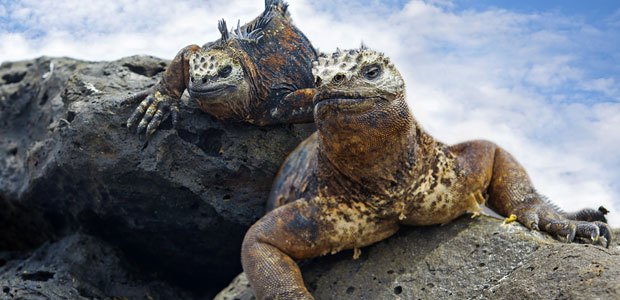Advertisement
Wildlife Wednesday: Marine Iguana
How long can you hold your breath? A minute? Maybe a minute and a half? No matter how long it may be, the marine iguana has got all of us beat. These unlikely deep-sea divers can hold their breath for more than an hour—a useful tool, considering they find their food in the deep blue … Continued

How long can you hold your breath? A minute? Maybe a minute and a half?
No matter how long it may be, the marine iguana has got all of us beat. These unlikely deep-sea divers can hold their breath for more than an hour—a useful tool, considering they find their food in the deep blue sea.
Habitat
Marine iguanas, to no one’s surprise, make their homes on the rocky shorelines of some islands. “Some islands” being the Galápagos Islands.
Trivia
- What do you eat when you’re a ferocious-looking lizard with a face like Godzilla? … Algae. As a matter of fact, they spend much of their swimming time munching on the green stuff that grows on the sea floor.
- Their breath-holding skills help them dive 33 ft (10 m) or more and, when diving, their heart rate slows by about half, allowing them to conserve energy.
- Like any other reptile, marine iguanas can’t regulate their own body temperature. As a result, these lazy lizards spend their afternoons basking in the sun or lazing against sun-warmed rocks.
- Being the cold-blooded (and -hearted) reptiles they are, there’s no love between parents and young. Females, after guarding her nest for several days, will leave eggs to fend for themselves for the majority of their 95-day incubation period.
Why are they threatened?
Marine iguanas face quite a few threats—and only some of them are caused by humans. El Niño, for instance—a warming of the Pacific Ocean current that passes by the South American coast—causes increased water temperatures and sea levels around the islands, and can cause mortality rates of up to 85 percent in some iguana subpopulations.
Animals introduced to the Galápagos Islands by people—such as dogs, cats, and pigs—prey on iguanas and their eggs, and have wreaked havoc on hatchling populations on more than one occasion. Oil spills and other types of water pollution also cause problems for these sea-lovers, since it affects the beaches where they nest and the algae reserves that they rely on for food.





